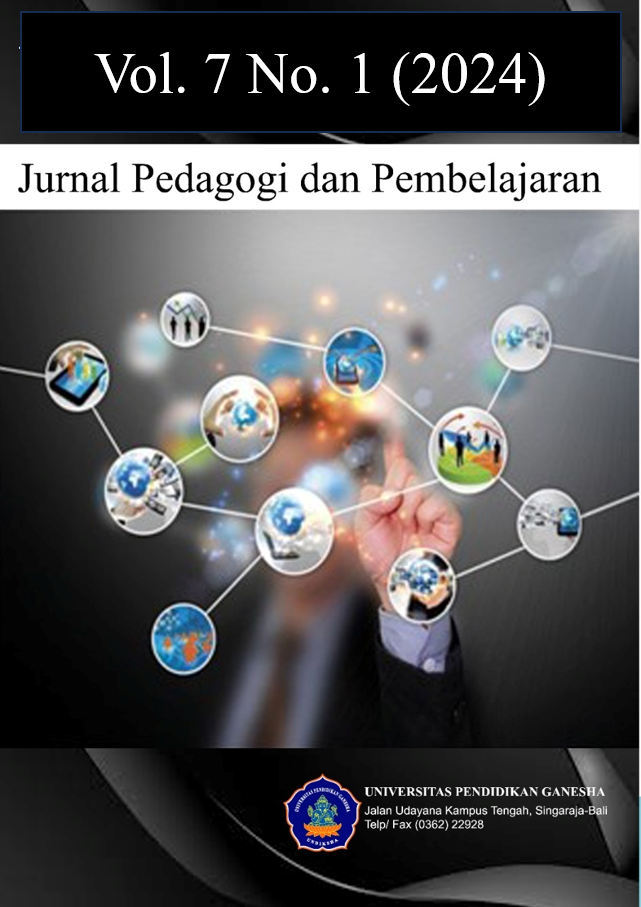Unveiling the Power of Pedagogically Productive Conversations Among University Teachers
DOI:
https://doi.org/10.23887/jp2.v7i1.71177Kata Kunci:
Pedagogically Productive Conversations, University Teachers, Student Learning Outcomes, Teacher Efficacy, Supportive EnvironmentsAbstrak
The significance and benefits of discussion in higher education contexts have the potential to improve teaching practices, encourage professional development, and ultimately improve student learning outcomes. This study aims to analyze the potential impact of pedagogically productive conversations among university teachers. The research method uses Systematic Literature Review (SLR). A literature search was conducted through academic databases, such as PubMed, ERIC, and Google Scholar. Through a comprehensive review of relevant literature and firsthand insights from educators, the study delves into the intricacies of pedagogically productive conversations, emphasizing their role in promoting collaboration and creating a supportive academic environment. Furthermore, the paper discusses the challenges and barriers that may impede the implementation of such conversations and proposes strategies to overcome them. Overall, this position paper serves as a valuable resource for educators, administrators, and policymakers, offering insights into the transformative power of pedagogically productive conversations and advocating for their integration into the fabric of university teaching.
Referensi
Akhtar, R. N. (2020). Exploring Experiential Learning Models and developing an EL based ERE cycle in teaching at higher education in Pakistan. International Journal of Experiential Learning & Case Studies, 5(2). https://doi.org/10.22555/ijelcs.v5i2.44. DOI: https://doi.org/10.22555/ijelcs.v5i2.44
Anggeraini, Y. (2018). Interactive Teaching: Activities and The Use of Technology in EFL classroom. LANGUAGE CIRCLE: Journal of Language and Literature, 13(1), 1–6. 3. https://doi.org/https://doi.org/10.15294/lc.v13i1.11131.
Ankrah, S., & Omar, A. T. (2015). Universities–Industry Collaboration: A Systematic Review. Scandinavian Journal of Management, 31(3), 387–408. https://doi.org/10.1016/j.scaman.2015.02.003. DOI: https://doi.org/10.1016/j.scaman.2015.02.003
Archambault, L., Wetzel, K., Foulger, T. S., & Kim Williams, M. (2010). Professional Development 2.0: Transforming Teacher Education Pedagogy with 21st-Century Tools. Journal of Digital Learning in Teacher Education, 27(1), 4–11. https://doi.org/10.1080/21532974.2010.10784651. DOI: https://doi.org/10.1080/21532974.2010.10784651
Barkley, E. F., & Major, C. H. (2020). Student Engagement Techniques: A Handbook for College Faculty. John Wiley & Sons.
Barron, T., Friend, M., Dieker, L., & Kohnke, S. (2022). Co-Teaching in Uncertain Times: Using Technology to Improve Student Learning and Manage Today’s Complex Educational Landscape. Journal of Special Education Technology, 37(3), 439–446. https://doi.org/10.1177/016264342110335. DOI: https://doi.org/10.1177/01626434211033579
Bauman, C. (2015). A Refreshing Perspective on Teacher Leadership: How Teacher Leaders Effectively Combine the Use of Autonomy and Collaboration to Enhance School Improvement. Leading and Managing, 21(2), 46–59. https://doi.org/10.3316/ielapa.164471681521728.
Brownell, S. E., & Tanner, K. D. (2012). Barriers to Faculty Pedagogical Change: Lack of Training, Time, Incentives, and Tensions with Professional Identity. CBE—Life Sciences Education, 11(4), 339–346. https://doi.org/10.1187/cbe.12-09-0163. DOI: https://doi.org/10.1187/cbe.12-09-0163
Carney, M. A., Ng, L. E., & Cooper, T. (2016). Professional Development Amid Change: Fostering Academic Excellence and Faculty Productivity at Teaching-Intensive Universities. The Journal of Faculty Development, 30(2), 27–35. https://www.ingentaconnect.com/content/magna/jfd/2016/00000030/00000002/art00004.
Coles, A. (2019). Facilitating the Use of Video With Teachers of Mathematics: Learning From Staying with the Detail. International Journal of STEM Education, 6(1). https://doi.org/10.1186/s40594-018-0155-y. DOI: https://doi.org/10.1186/s40594-018-0155-y
Cotton, D. R., Warren, M. F., Maiboroda, O., & Bailey, I. (2007). Sustainable Development, Higher Education and Pedagogy: A Study Of Lecturers’ Beliefs and Attitudes. Environmental Education Research, 13(5), 579–597. https://doi.org/10.1080/13504620701659061. DOI: https://doi.org/10.1080/13504620701659061
Didion, L., Toste, J. R., & Filderman, M. J. (2020). Teacher Professional Development and Student Reading Achievement: A Meta-Analytic Review of The Effects. Journal of Research on Educational Effectiveness, 13(1), 29–66. https://doi.org/10.1080/19345747.2019.1670884. DOI: https://doi.org/10.1080/19345747.2019.1670884
Dodor, B. A., Sira, N., & Hausafus, C. O. (2010). Breaking Down the Walls of Teacher Isolation. Journal of Family & Consumer Sciences Education, 28(1). https://natefacs-ojs-ttu.tdl.org/natefacs/article/view/85.
Dorrer, J. (2015). Analyzing Labour Markets in Real-Time. Teachers College Press.
Gillies, R. M. (2019). Promoting Academically Productive Student Dialogue During Collaborative Learning. International Journal of Educational Research, 97, 200–209. https://doi.org/10.1016/j.ijer.2017.07.014. DOI: https://doi.org/10.1016/j.ijer.2017.07.014
Gore, J. M., Griffiths, T., & Ladwig, J. G. (2004). Towards Better Teaching: Productive Pedagogy as A Framework for Teacher Education. Teaching and Teacher Education, 20(4), 375–387. https://doi.org/10.1016/j.tate.2004.02.010. DOI: https://doi.org/10.1016/j.tate.2004.02.010
Handelsman, J., Ebert-May, D., Beichner, R., Bruns, P., Chang, A., DeHaan, R., & Wood, W. B. (2004). Scientific Teaching. Science, 304(5670), 521–522. https://doi.org/10.1126/science.1096022. DOI: https://doi.org/10.1126/science.1096022
Harju, V., Koskinen, A., & Pehkonen, L. (2019). An Exploration of Longitudinal Studies of Digital Learning. Educational Research, 61(4), 388–407. https://doi.org/10.1080/00131881.2019.1660586. DOI: https://doi.org/10.1080/00131881.2019.1660586
Hauge, K. (2019). Teachers’ Collective Professional Development in School: A Review Study. Cogent Education, 6(1). https://www.tandfonline.com/doi/abs/10.1080/2331186X.2019.1619223. DOI: https://doi.org/10.1080/2331186X.2019.1619223
Hazzan, O., & Nutov, L. (2014). Teaching and Learning Qualitative Research: Conducting Qualitative Research. Qualitative Report, 19(24). https://core.ac.uk/download/pdf/51086760.pdf. DOI: https://doi.org/10.46743/2160-3715/2014.1218
Hénard, F., & Roseveare. (2012). Fostering Quality Teaching in Higher Education:Policies and Practices. NY: USA.
Hiebert, J., Gallimore, R., & Stigler, J. W. (2002). A Knowledge Base for the Teaching Profession: What Would it Look Like and How Can We Get One? Educational Researcher, 31(5), 3–15. https://doi.org/10.3102/0013189X031005003. DOI: https://doi.org/10.3102/0013189X031005003
İlhan, G. O., Kaba, G., & Sin, M. (2021). Usage of Digital Comics in Distance Learning During COVID-19. International Journal on Social and Education Sciences, 3(1), 161–179. https://doi.org/10.46328/ijonses.106. DOI: https://doi.org/10.46328/ijonses.106
Khan, N. (2017). Adaptive or Transactional Leadership in Current Higher Education: A Brief Comparison. International Review of Research in Open and Distance Learning, 18(3), 178–183. https://doi.org/10.19173/irrodl.v18i3.3294. DOI: https://doi.org/10.19173/irrodl.v18i3.3294
Laurillard, D. (2009). The Pedagogical Challenges to Collaborative Technologies. International Journal of Computer-Supported Collaborative Learning, 4, 5–20. https://link.springer.com/article/10.1007/s11412-008-9056-2. DOI: https://doi.org/10.1007/s11412-008-9056-2
Lawless, K. A., & Pellegrino, J. W. (2007). Professional Development in Integrating Technology into Teaching and Learning: Knowns, Unknowns, and Ways to Pursue Better Questions and Answers. Review of Educational Research, 77(4), 575–614. https://doi.org/10.3102/003465430730992. DOI: https://doi.org/10.3102/0034654307309921
Lefstein, A., Vedder-Weiss, D., & Segal, A. (2020). Relocating Research on Teacher Learning: Toward Pedagogically Productive Talk. Educational Researcher, 49(5), 360–368. https://doi.org/10.3102/0013189X20922998. DOI: https://doi.org/10.3102/0013189X20922998
Lingard, B., Hayes, D., & Mills, M. (2003). Teachers and Productive Pedagogies: Contextualising, Conceptualising, Utilising. Pedagogy, Culture and Society, 11(3), 399–424. https://doi.org/10.1080/14681360300200181. DOI: https://doi.org/10.1080/14681360300200181
Manfra, M. M. (2019). Action Research and Systematic, Intentional Change in Teaching Practice. Review of Research in Education, 43(1), 163–196. https://doi.org/10.3102 /0091732X18821132. DOI: https://doi.org/10.3102/0091732X18821132
Michaels, S., & O’Connor, C. (2015). Conceptualizing Talk Moves as Tools: Professional Development Approaches for Academically Productive Discussion. In Socializing intelligence through talk and dialogue (pp. 347–362). https://www.torrossa.com/gs/resourceProxy?an=5327590&publisher=FZT653#page=358. DOI: https://doi.org/10.3102/978-0-935302-43-1_27
O’Connor, C., & Michaels, S. (2019). Supporting Teachers in Taking Up Productive Talk Moves: The Long Road to Professional Learning at Scale. International Journal of Educational Research, 97, 166–175. https://doi.org/10.1016/j.ijer.2017.11.003. DOI: https://doi.org/10.1016/j.ijer.2017.11.003
Pamungkas, S. F., Widiastuti, I., & Suharno. (2020). 21st Century Learning: Experiential Learning to Enhance Critical Thinking in Vocational Education. Universal Journal of Educational Research, 8(4), 1345–1355. https://doi.org/10.13189/ujer.2020.080427. DOI: https://doi.org/10.13189/ujer.2020.080427
Randel, B., Apthorp, H., Beesley, A. D., Clark, T. F., & Wang, X. (2016). Impacts of Professional Development in Classroom Assessment on Teacher and Student Outcomes. The Journal of Educational Research, 109(5), 491–502. https://doi.org/10.1080/00220671.2014.992581. DOI: https://doi.org/10.1080/00220671.2014.992581
Saracaloǧlu, A. S., & Dinçer, I. B. (2009). A Study on Correlation Between Self-Efficacy and Academic Motivation of Prospective Teachers. Procedia - Social and Behavioral Sciences, 1(1), 320–325. https://doi.org/10.1016/j.sbspro.2009.01.060, A. S., & Din DOI: https://doi.org/10.1016/j.sbspro.2009.01.060
Sarakikya, A. (2022). Reflecting on Higher Education Institutions’ Response to Evolving Demands of Human Resources in Tanzania: University of Dar es Salaam Experience. Papers in Education and Development, 39(1). http://www.journals.udsm.ac.tz/index.php/ped/article/download/4571/3977.
Schneider, M., & Preckel, F. (2017). Variables Associated with Achievement in Higher Education: A Systematic Review of Meta-Analyses. Psychological Bulletin, 143(6), 565. DOI: https://doi.org/10.1037/bul0000098
Shine, B., & Heath, S. E. (2020). Techniques for Fostering Self-Regulated Learning via Learning Management Systems in On-Campus and Online Courses. Journal of Teaching and Learning with Technology, 9(1), 119–126. https://doi.org/10.14434/jotlt.v9i1.29014. DOI: https://doi.org/10.14434/jotlt.v9i1.29014
Stover, K., Yearta, L., & Harris, C. (2016). Experiential Learning for Preservice Teachers: Digital Book Clubs With Third Graders. Journal of Digital Learning in Teacher Education, 32(1), 5–12. https://doi.org/10.1080/21532974.2015.1055013. DOI: https://doi.org/10.1080/21532974.2015.1055013
Sukmayadi, V., & Yahya, A. H. (2020). Indonesian Education Landscape and The 21st Century Challenges. Journal of Social Studies Education Research, 11(4), 219–234. https://www.learntechlib.org/p/218538/.
Tsui, L. (2002). Fostering Critical Thinking Through Effective Pedagogy: Evidence from Four Institutional Case Studies. The Journal of Higher Education, 73(6), 740–763. https://doi.org/10.1080/00221546.2002.11777179. DOI: https://doi.org/10.1353/jhe.2002.0056
Winberg, C., Wright, J., Wolff, K. E., Pallitt, N., Bozalek, V. G., & Conana, H. (2018). Critical Interdisciplinary Dialogues: Towards A Pedagogy of Well-Being in Stem Disciplines and Fields. South African Journal of Higher Education, 32(6), 270–287. https://doi.org/10.20853/32-6-2975. DOI: https://doi.org/10.20853/32-6-2975
Wong, J. K. (2004). Are the Learning Styles of Asian International Students Culturally or Contextually Based? Journal International Education, 4(4), 54–59. https://files.eric.ed.gov/fulltext/EJ903817.pdf.
Unduhan
Diterbitkan
Cara Mengutip
Terbitan
Bagian
Lisensi
Hak Cipta (c) 2023 Moses Adeleke Adeoye, Paul Olaolu Akinnubi, Semiu Olawale Makinde, Owoyale-Abdulganiy, Muhydeen Olaitan Abiola

Artikel ini berlisensiCreative Commons Attribution-ShareAlike 4.0 International License.
Authors who publish with Jurnal Pedagogi dan Pembelajaran agree to the following terms:- Authors retain copyright and grant the journal the right of first publication with the work simultaneously licensed under a Creative Commons Attribution License (CC BY-SA 4.0) that allows others to share the work with an acknowledgment of the work's authorship and initial publication in this journal
- Authors are able to enter into separate, additional contractual arrangements for the non-exclusive distribution of the journal's published version of the work (e.g., post it to an institutional repository or publish it in a book), with an acknowledgment of its initial publication in this journal.
- Authors are permitted and encouraged to post their work online (e.g., in institutional repositories or on their website) prior to and during the submission process, as it can lead to productive exchanges, as well as earlier and greater citation of published work. (See The Effect of Open Access)










